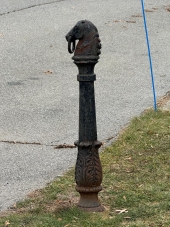
 3
3





 2
2




We can green the world through random acts of planting.
 3
3





"We're all just walking each other home." -Ram Dass
"Be a lamp, or a lifeboat, or a ladder."-Rumi
"It's all one song!" -Neil Young
 4
4











 1
1




Judith Browning wrote:
edit to wonder about word usage......I've always called what I think we're talking about a 'dish rag' and it's counterpart in the shower a 'wash rag'







 3
3




To that end, I've been using handwoven dishcloths.
They last for ages, have a lovely texture for cleaning dishes, and have a low ecological impact. My favourites are made from cotton or linen, one can even get organic cotton yarn for this (most, if not all, linen for this kind of thing is grown organic style). These last ages longer than commercial dish rags.
"We're all just walking each other home." -Ram Dass
"Be a lamp, or a lifeboat, or a ladder."-Rumi
"It's all one song!" -Neil Young
 2
2




 - but I can crochet, so this winter might be a good time to make some cloths.
- but I can crochet, so this winter might be a good time to make some cloths.
 ) because he doesn't like to use the same towel over and over to dry his hands. So I was thinking of ways to work with him on this, and still have something that wasn't a throw away/landfill issue. But I think I'm just going to have to do it my way, and let him work through it. I'm hoping he'll get past it, and stop worrying about it.
) because he doesn't like to use the same towel over and over to dry his hands. So I was thinking of ways to work with him on this, and still have something that wasn't a throw away/landfill issue. But I think I'm just going to have to do it my way, and let him work through it. I'm hoping he'll get past it, and stop worrying about it.
 1
1




 1
1




 2
2





 2
2




They supposedly don't do well colder than zone 7, so probably won't work for you unless maybe started indoors.
"We're all just walking each other home." -Ram Dass
"Be a lamp, or a lifeboat, or a ladder."-Rumi
"It's all one song!" -Neil Young
 3
3











 7
7




Judith Browning wrote:
They supposedly don't do well colder than zone 7, so probably won't work for you unless maybe started indoors.
They grow well here for some folks. My son grew a bumper crop just a bit farther south than us and a friend here locally grows a short sponge version that does very well..they were part of her market crop. I always forget to start them early indoors so mine usually don't mature...great viney plant and another one that deer and bunnies don't seem to like so can grow on the garden fence.
 4
4





 5
5




they also shed little bits of themselves.
"We're all just walking each other home." -Ram Dass
"Be a lamp, or a lifeboat, or a ladder."-Rumi
"It's all one song!" -Neil Young
 1
1





 1
1




Invasive plants are Earth's way of insisting we notice her medicines. Stephen Herrod Buhner
Everyone learns what works by learning what doesn't work. Stephen Herrod Buhner
 2
2




 1
1




 4
4











 2
2




R Ranson wrote:One thing that germs love is a moist environment. If your dishcloth can dry all the way, at least once a day, then it's darn near impossible for germs to grow in there. That's one of the reasons why I don't like sponges.
 1
1




 1
1











 1
1





 1
1




I'm super rough with my stainless with metal scrubbers







 4
4




 2
2





 1
1




 2
2




Tracy Wandling wrote:I am looking for a long-lived dish cloth. My significant other is a fan of sponges with a scrubby on the back. I don't like them. They don't last, and as the sponge and scrubby fall apart, little bits fall off. Pretty sure that's not good for the septic, not to mention our messed up plumbing. I am happy to use a regular old dish cloth, but the man has a thing about them - too germy or something, I don't know.

$10.00 is a donation. $1,000 is an investment, $1,000,000 is a purchase.
 3
3




If the wind doesn't blow, row.
 1
1




Learnin' as I go... www.jamig4.wordpress.com
Check us out on YouTube... Harn Theory
 1
1




 3
3




Nothing difficult is ever easy!
 7
7




 . I am gathering cloth, towels, and old clothes, and will be ripping and sewing shortly! Going to make dish rags, and some of R Ranson's Zokin cleaning cloths.
. I am gathering cloth, towels, and old clothes, and will be ripping and sewing shortly! Going to make dish rags, and some of R Ranson's Zokin cleaning cloths.
 - just occurred to me. I am the only one who does dishes in this house. So, I am going to do them my way, with a cloth, like I've always done.
- just occurred to me. I am the only one who does dishes in this house. So, I am going to do them my way, with a cloth, like I've always done. 
 But it's generally not necessary. I haven't gotten cast iron pans yet, but when I do I'll look into the chain mail. For now, I'll use a wooden spatula if it's needed.
But it's generally not necessary. I haven't gotten cast iron pans yet, but when I do I'll look into the chain mail. For now, I'll use a wooden spatula if it's needed.

 2
2




 2
2




Southern Ontario, Canada
www.smallbones.ca
 2
2




 1
1




 2
2





|
Everyone is a villain in someone else's story. Especially this devious tiny ad:
Learn Permaculture through a little hard work
https://wheaton-labs.com/bootcamp
|




